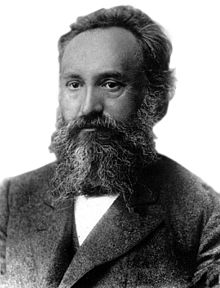Evgraf Stepanovich Fyodorov
| Evgraf Fedorov | |
|---|---|

Evgraf Stepanovich Fedorov
|
|
| Born |
22 December 1853 Orenburg, Russian Empire |
| Died | 21 May 1919 (aged 65) Petrograd, RSFSR |
Evgraf Stepanovich Fedorov (Russian: Евгра́ф Степа́нович Фёдоров, 22 December [O.S. 10 December] 1853 – 21 May 1919) was a Russian mathematician, crystallographer and mineralogist.
Fedorov was born in the Russian city of Orenburg into a family of engineers. The family later moved to Saint Petersburg. From the age of fifteen he was deeply interested in the theory of polytopes, which later became his main research interest. He was a distinguished graduate of the Gorny Institute, which he joined at the age of 26.
He contributed to the identification of conditions under which a group of Euclidean motions must have a translational subgroup whose vectors span the Euclidean space. His best-known result is his 1891 proof that there are only 17 possible wallpaper groups which can tile a Euclidean plane. This was then proved independently by George Pólya in 1924. The proof that the list of wallpaper groups was complete only came after the much harder case of space groups had been settled. In 1895, he became a professor of geology at the Moscow Agricultural Institute (now the Timiryazev Academy). Fedorov died from pneumonia in 1919 during the Russian Civil War in Petrograd, RSFSR.
...
Wikipedia
